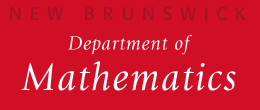The Employment Market for Mathematics Majors
Many employers like to hire mathematics majors because they are smart, they are hard-working, and they have shown that they can learn. However, in the 21st Century, many jobs require more technical knowledge than a typical undergraduate acquires. For this reason, employers tend to look first for graduates with masters degrees in mathematical disciplines such as
- Mathematics Education
- New Jersey certification as a mathematics teacher is available to students who complete the Graduate School of Education's five-year mathematics teacher certification program. For such students, the eight courses required at the 300- to 400-level for the mathematics major must include 01:640:300; 311 or 411; 351 or 451; 435; 436; 477; 481; and an applied mathematics course, in addition to an extra mathematics elective and the courses required for certification.
- Students interested in teacher certification should read the GSE's web page on the five-year teacher education program. They should also contact Professor Keith Weber Graduate School of Education as early in their undergraduate career as possible to obtain advice and further information.
- Industrial and Systems Engineering
- Students entering the five-year dual degree program in Industrial and Systems Engineering must complete a standard math major. They must have Math 477; Engineering Economics (14:540:343)–: see catalogue for prerequisites, Linear Programming (Math 354 or Math 453; Math 453 is preferred); and facility with a programming language like C++. For students who do not major in engineering, I.S.E. sets a cumulative g.p.a. of 3.2 or better as one guideline for admissibility into the Master's program. Grades in mathematics courses and other technical courses are most important.
- Select at least some math electives from Math 321 (Introduction to Applied Mathematics), Math 424 (Stochastic Models in Operations Research), Math 429 (Case Studies in Industrial Mathematics), Math 478 (Probability II), Math 481 (Mathematical Statistics), Math 428 (Graph Theory), and Math 454 (Combinatorics).
- Select at least some general electives from computer sciencescourses beyond C.S. 111 or 107; Economics 406 (Game Theory), ISE 338 (Probability Models in Operations Research), ISE 433 (Quality Engineering and Statistics), Statistics 384 (Intermediate Statistical Analysis), Statistics 390 (Introductory Computing for Statistics), Statistics 401 (Basic Statistics for Research), and Statistics 484 (Basic Applied Statistics).
- For more information, see the Industrial and Systems Engineering web page.
- Statistics
- Operations Research
- Mathematical Finance
- Economics: there is no longer a joint program with Economics, but an undergraduate mathematics major can provide good preparation for graduate work in Economics. See the Economics Department Home page for more information.
Studying for a Masters Degree at Rutgers
The Department of Mathematics has worked out a number of "tracks" or "sequences" which make it easy to move on from an undergraduate major in mathematics to a masters degree in fields where graduates are in demand.
You can click on the links above to get more detailed information.
The Standard Path from a B.A. to a Masters Degree
Usually students apply to a masters program (at Rutgers or elsewhere) in their senior year of college. Others apply after a period of employment. A Master of Science (M.S.) or Master of Arts (M.A.) degree can usually be completed in 2 years of full-time graduate study. Part-time study is often permitted.
The Instensive Five-Year B.A.-M.A. Sequence at Rutgers
In an intensive sequence, students take extra work before graduating from college which can be transferred to the masters program. Students apply in their third undergraduate year. With careful planning, the masters degree can be earned in one year of full-time study after completion of the undergraduate degree.








